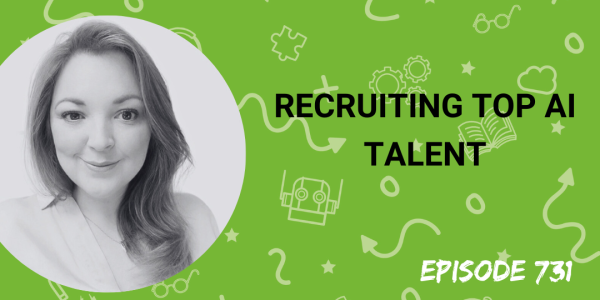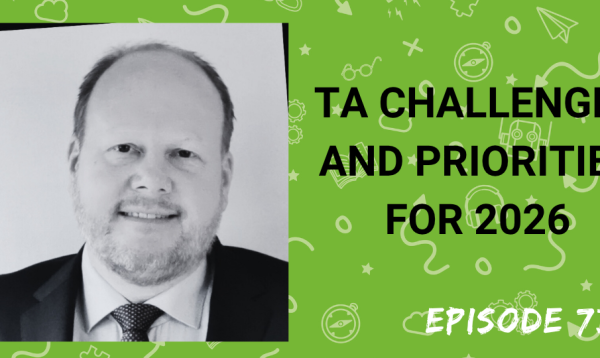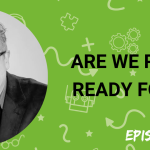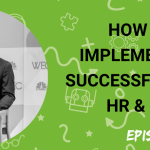The ongoing slump in tech hiring is well-documented. However, the demand for talented AI professionals, particularly at the leadership level, is absolutely off the scale. With unprecedented salaries being promised by the leading AI players, how can other employers compete, and what do the TA team need to know to secure the talent their organisation needs?
My guest this week is Rebecca Hastings, founder of Lucent Search. Rebecca has been hiring AI leaders for her clients for over a decade and a half, and Lucent Search recently published a research report investigating what top AI Leaders want from their jobs and careers. In our conversation, we explore some of the findings, and Rebecca offers some very valuable advice to TA teams looking for top AI talent.
In the interview, we discuss:
• The rise of the Chief AI Officer and the reshaping of the C-Suite
• Career frustration and the loyalty penalty
• The perception AI Leaders have of talent acquisition
• Why humans are still critical in AI projects and transformations
• What motivates AI professionals to change jobs
• Which skills are most in demand?
• Where should AI transformation sit in the business?
• What does the future look like?
Follow this podcast on Apple Podcasts.
Follow this podcast on Spotify.
00:00
Matt Alder
The demand for AI professionals is skyrocketing. So what do TA teams need to know to hire the best AI talent for their organizations? Keep listening to find out. Support for this podcast comes from Greenhouse. Greenhouse is the only hiring software you’ll ever need with built in analytics that deliver on demand insights. Greenhouse helps hiring teams align faster with stakeholders and make more confident hiring decisions. Greenhouse analytics empowers recruiting teams to explore data freely. No add on tools are needed. Query filter and build reports, drill into historical trends and create custom analyses to answer critical questions on pipeline, health, performance and sourcing efficiency. Greenhouse has helped over 7,500 customers across diverse industry verticals from early stage to enterprise become global great at hiring, including companies like Airbnb, HubSpot, Lyft, SeatGeek, HelloFresh and DoorDash.
01:13
Matt Alder
If you’re ready to navigate your hiring data your way, you can visit greenhouse.com to learn more. Hi there. Welcome to episode 731 of Recruiting Future with me, Matt Alder. Recruiting Future helps talent acquisition teams drive measurable impact by developing their strategic capability in foresight, influence, talent and technology. If you’re interested in finding out how your TA function measures up in these four critical areas, I I’ve created the Free Fit for the Future assessment. It’ll give you personalized insights to help you build strategic clarity and drive greater impact immediately. Just head over to Mattalder.me/podcast to complete the assessment. It only takes a few minutes. This episode is all about talent. The ongoing slump in tech hiring is well documented. However, the demand for talented AI professionals, particularly at a leadership level, is absolutely off the scale.
02:39
Matt Alder
With unprecedented salaries being promised by the leading AI players, how can other employers compete and what do TA teams need to know to secure the talent that their organization needs? In our conversation we explore some of the findings and Rebecca offers some very valuable advice to TA teams looking for top AI talent. Rebecca has been hiring AI leaders for her clients for over a decade and a half, and Lucent Search recently published a report investigating what top AI leaders want from their jobs and their careers. In our conversation we explore some of the findings and Rebecca offers some very valuable advice to TA teams looking for top AI talent. Hi Rebecca and welcome to the podcast.
03:25
Rebecca Hastings
Thank you so much for having me, Matt.
03:27
Matt Alder
So I am the founder of an exec search company called Lucent Search and we Focus on technology and AI, specifically at the leadership level as well as doing talent consultancy.
03:28
Matt Alder
You on the show.
03:29
Matt Alder
Please could you introduce yourself and tell.
03:32
Matt Alder
Everyone what you do?
03:34
Rebecca Hastings
So I am the founder of an exec search company called listensearch and we Focus on technology and AI, specifically at the leadership level as well as doing talent consultancy. I’ve worked in the technology hiring sector for over 18 years now, so I am a recruitment adult, but I have in that time worked a mixture of in house leading talent acquisition functions and then also doing exec search externally for businesses or strategic consultancy around AI is something that’s happened over the last year or two.
04:10
Matt Alder
Yeah, absolutely. And obviously such an interesting area from a recruitment perspective. You kind of recently done some research, kind of written a report. Tell us a little bit about that, how you did it and why you did it.
04:23
Rebecca Hastings
Absolutely. So last year at the end of 2024, I identified that there was just so much noise about what was happening in the AI world, but not much learning about what was going on in the minds of the leaders. And for my clients, they’re either selling to those people or those people are my clients that are looking to hire. We could see the rise of the chief AI officer role. It kind of reminded me of a point about 10 years ago where data center started to happen. Did it lie with digital, did it lie with tech, did it lie with marketing?
04:59
Rebecca Hastings
So I wanted to really understand that and what was happening in those people’s worlds, what their challenges, pain points were, and then give myself an opportunity to revisit those people and understand what was actually working, where were the nuggets that we could all gain valuable information from.
05:18
Matt Alder
Fantastic.
05:19
Matt Alder
Again, it’s such an interesting topic because obviously a lot of companies are looking for AI talent at the moment and I’m sure a lot will, more will be in the future. And it’s kind of one of those areas where I think if you spoke to people about it, other than war, it’s probably quite difficult to recruit people with the right skills because there’s probably not very many of them. I’m not sure people have really kind of dug into some of the nuances around it. So what were some of the kind of the top line things that you found that would be really helpful for TA people to know?
05:45
Rebecca Hastings
Absolutely. So for context, the respondents to this were mid market enterprise, globally, across like North America, EMEA and Asia Pacific. The most staggering fact for me that I uncovered, which took me by surprise, was that 63% of the respondents were planning on leaving their role within the next year. I had kind of expected it to be around 35% based on the conversations I was having with people. And you know, when I went through the survey results like it was absolutely clear to me this is about frustration, a lack of autonomy and a real loyalty penalty about how we are rewarding some of those individuals. There was a lot of stuff around talent acquisition and hiring being absolutely tough as nails in some areas.
06:33
Rebecca Hastings
91% of these AI leaders who are C level execs or the level below were saying getting the top AI talent is really hard, it’s slowing them down. And then 87% of them were really concerned about retaining these people once they had secured them into the organization. But a big takeaway that maybe will not surprise lots of people if they’re in those businesses is over half of them, just over half, are really struggling with cross functional collaboration in general. And that’s not just with ta, but you know, there was a lot of friction points with finance and other areas of the business.
07:08
Matt Alder
Yeah, I can imagine it’s a really interesting picture to dig into some of those in a bit more detail. Let’s talk about sort of that relationship with TA and recruiting. Are the TA people working in those organizations, you know, delivering. What’s the kind of perception that the leadership has of their recruitment functions of recruiting in general?
07:26
Rebecca Hastings
So I would say it was either really positive or really negative. When I had the follow up conversations, there was a lot of frustration with how TA and HR are supporting hiring needs in general, especially the more technical AI leaders. They felt that the TA teams did not fully understand the exact requirements of what they were really looking to deliver and they didn’t maybe understand the business goal. Not just like we’re looking for people with X, Y and Z skills. And I also think that there was a lot of frustration because these leaders were saying the projects will not work if we do not have the right people. All of the tech is there, we have the budget for it, but if we don’t have the people, we can’t hit the milestones for the business. And they’re under huge pressure to deliver it.
08:14
Rebecca Hastings
So I think that when it was really working, those TA experts and partners in those businesses were really enabling the AI transformation in general. They were doing really strategic partnering. All of this stuff that we truly enjoy and love doing. But I think just the sheer volume of things that TA are having to do at the moment, you know, especially with pressure on headcount, just makes it really difficult.
08:41
Matt Alder
And it’s really interesting with so much kind of rhetoric very often coming out of the AI companies themselves about AIs replacing humans, that having the right humans is actually the thing that’s holding a lot of them back.
08:55
Rebecca Hastings
Yeah, absolutely. I mean they obviously have a vested interest in saying that. And those companies are incredibly discerning about the talent that they onboard. I think that they’re really careful about who they hire and they have eye watering budgets that some of us will just never be able to match. So they do have an edge there. While some of these roles can potentially be done by AI, anyone who’s working in the tech sector knows that there’s still a high level of oversight that needs to happen. Not just for legislatory reasons, but just stability, product quality, understanding, customer needs, that empathy, communicating across the business. And that’s something which is just a theme. Collaboration in general. If you do not have headcount, it’s really hard to understand what is going on. People just aren’t there to talk to each other. They’re under pressure.
09:53
Matt Alder
So what is it that TA people really need to know in terms of what makes people with this kind of skill set move jobs? What makes them stay? What are their motivations? What is it? That is the kind of the secret sauce, if you like, in terms of, you know, being successful at getting AI people into a business.
10:12
Rebecca Hastings
So I think it’s slightly different at the individual contributor level as well as at the executive level. At the executive level it’s all about will I have the autonomy, will I have the influence and the authority and what are the relationships at the C suite? Are they going to hold me back? Because that is one of the big frustrations that is driving that 63% of people from actually staying. They want to move because of those problems. They cannot deliver without everything being aligned. Then I would also say that at the individual contributor level that talent is so much more about how viable is the business. Some of the things which we’re just seeing across the board just now, candidates in general are asking much smarter questions about how much Runway there is this feasible, what is the leadership like in the culture?
11:10
Rebecca Hastings
But it’s all about how you present it to them. These people get so many approaches, you have to be hyper personalized, really stand out. I have found that doing really technical videos, for example, with hiring managers and sharing them with candidates, it just gives them so much more confidence about what they’re going to do. They get so many approaches that if you can get your hiring manager to engage in that and it really proves that partnering piece which TA has come on under fire with.
11:39
Matt Alder
Yeah, and I guess that’s kind of really important because there’s obviously a lot about money and salaries flying around, particularly with Meta’s attempt to buy top AI talent at kind of seemingly ridiculous sums of money or just their attempt to break their competitors wage structure, whatever it was. But it’s really much more than that people are looking for, isn’t it? It’s kind of the to learn to do great work, sustainable stuff.
12:01
Rebecca Hastings
Yeah, people really care about what they’re doing and is this good for the world in particular? Like they’re, you know, people who, this line of work are quite thoughtful naturally and they care about what are they going to be remembered for. They maybe don’t frame it in that way, but more so than ever I think people are concerned about that having career longevity, getting to work with the right skill, like right tools for example, is very important. But I would say, yeah, the culture is still vital. I think that if you are trying to get this kind of talent into your business and you’re making everyone work every hour of the day in office, it’s just you’ve no way of getting the best talent just now.
12:49
Rebecca Hastings
You do need to have like treat these people like the smart individuals they are and let them work in the environment where they do the best work.
12:57
Matt Alder
Yeah, because I presume we’re talking about a global talent pool here in terms of people sort of working all over the world, not necessarily being concentrated into specific geographical places.
13:06
Rebecca Hastings
Definitely most of the leaders that I surveyed had distributed teams. They had teams that were global. In fact, if they had a team that was global, so like for example, across more than one continent, then that made a significant difference to the level of influence they had at that senior end. And also their compensation reflected that. That was definitely something which would bump up what you would need to assign for somebody’s salary.
13:36
Matt Alder
Is your TA function fit for the future? Over the last 10 years, I’ve done podcast interviews with hundreds of the world’s most successful TA leaders and discovered exactly what they all have in common. Four critical capabilities that drive their strategic impact, Foresight, influence, talent and technology. Visit Mattalder.me/podcast. That’s Mattalder.me/podcast. The assessment is completely free, takes five minutes to complete and you get your results instantly. Benchmark your talent acquisition capability right now and start proactively shaping your future. Visit Matulder Me podcast. That’s Matalder Me podcast. Let’s talk a little bit about skills.
14:47
Matt Alder
So want to talk about soft skills in a second. But almost like what are the skills that these people have? Because I think if we kind of look back at all the other technical, logical revolutions we’ve lived through, from the Internet. For everyone who’s old enough to E commerce, to cloud computing, to data, to all of those kind of things. What is it that makes an AI professional? What skills do they have?
15:08
Rebecca Hastings
Roughly half of the people who are in these kind of AI specific roles, they have a very deep technical vein with some core niche and the technologies surrounding that. And then they’ve moved up. But there were a surprising number of people who are not quite so technical that have come to this more from a business angle, maybe from data, which is slightly different technical skills in general. So the skill set was really varied in terms of what it was. That was, for me, as an observer, the difference between people at sea level and the level below. It was definitely the soft skills that were shining out. And I would say their mindset was just way more global strategic.
15:57
Rebecca Hastings
They were taking the true helicopter view of what was going on and not focusing on just like the minutiae of delivery of projects, but working across the business. And one of the interesting findings that I think ties in with some of the challenges all organizations are facing today was that when I asked people to rank the importance of functional business skills within what they perceive was most important within their teams, they put stakeholder management at the top, then change management, then project management, then financial management, Then at the bottom of the five skills I asked them about in that set, people in organizational design and the leaders who were truly executing.
16:43
Rebecca Hastings
Because all of these people have skills, but the ones who were actually nailing it, delivering huge returns on investment or productivity gains for their organization, they had flipped that they were people and organizational design first, then looking at the financial side, moving on to project management, change management, and stakeholder management in general. So they had a completely different perspective on how they went about it. And they were looking at this as like, how do we completely refresh our target operating model?
17:16
Matt Alder
That’s really interesting. And I think it also ties in with the kind of the whole reshaping of the C suite here, you know, chief AI officers, those kind of things. But also this kind of this. I don’t know whether it’s quite a trend yet, but this sort of move to, you know, certainly a few organizations have gone down this route of really kind of merging technology and people into the same thing, which is, I think something that may have taken. May have taken a lot of the HR industry by surprise.
17:44
Rebecca Hastings
I am not surprised by this for a number of reasons. I think for some organizations like Moderna, they recently announced that they’ve done this. It does make sense, but it doesn’t make sense for every company. However, as long as this is aiding collaboration, because that is the biggest obstacle stopping people from being successful. Because if you want to transform your organization using AI, your AI team who are building things can simply not uncover that without having relationships across the organization. And I think TA are exceptionally well poised and positioned to take advantage of this. My experiences are that TA are generally more technical than other areas of people ops.
18:30
Rebecca Hastings
And on top of that, one of the things that I loved about working in house was that I was one of the few people who knew everybody in the business that needed to be known. And I knew what was happening in every single department. I knew the pain points of all of the hiring managers there. So being that super connector is really valuable in that kind of situation. So TA have a great opportunity to elevate their standing. Some companies are looking at, is this a chief Resource officer? Do we need to move everything under operations in our business? I think it will be in flux and it’s going to work differently for every organization. But as long as it enables better collaboration between IT and hr, for example, that’s a big win if that’s what it takes.
19:21
Rebecca Hastings
But ultimately in that process, we need to make sure that we’re all really respectful of each other and the different skills that we have. Because there are things that, like, I’m really technical. There’s things though that IT and tech people just can do that. I would, you know, I’m just not going to be able to get there.
19:38
Matt Alder
Yeah, I think that’s a good point. I think people, operations, hr, talent, function, you know, whatever, it, however it’s kind of badged is so critical to this because we’re talking about change, management, organizational redesign, recruitment, learning, development, culture, all of those kind of things. So it should really kind of be central for anyone sort of working in that area. Give us your kind of advice to TA people who are listening, who may already be trying to recruit AI people or this is something that’s coming at them very quickly. What would your advice be? To kind of summarize what you sort.
20:10
Rebecca Hastings
Of said already really understand the business problem that you are trying to solve, because that is going to be one of the biggest hooks for talent that you’re bring. And they’re going to get to use those tools and technologies in loads of different companies. So you have to really position that carefully, make sure that you are like hybrids or like some kind of remote option for people with flexibility and I think that if you’re struggling to get the salaries that you feel you need, it’s really worth sitting down with your finance partner or whoever it is that you deal with about money and talking to them as a business person about the return on investment, how this is one of the most critical things for the business’s future success right now.
20:56
Rebecca Hastings
Without investing in the people, you’re not actually investing in solving the problem effectively and then having more of a business case rather than the market is this. That’s something that I think doesn’t really work. Whereas if you can talk about it’s not just that they spent this money, but they got this in return, or look at the share price of this company, who’s paying more, Try and speak their language back to them or you’re going to struggle. Because sometimes you might need to be punchy because some people are just worth a lot more than others right now because of the lessons learned. And even I would go as far as saying their mindset. So everyone’s talking about soft skills, but the one soft skill that I think is totally undervalued, that makes a huge difference, is how resilient your technical team are.
21:47
Rebecca Hastings
For years, you’re always thinking, going to hire resilient salespeople, we’re going to test them, we’re going to ask them questions to understand how resilient they are. That is so important in the AI world because most of the projects that you start get shelved. And my experience of hiring techies is they want to see what they’re doing. They get a massive reward from realizing and seeing the product being used. For example, if that’s not going to happen that often, you’re going to have to think about, are they the right people to do that?
22:20
Matt Alder
And as a final question, what does the future look like? Give us a view. What do you think the future looks like in terms of organizations, in terms of AI? What have you got out of the research that you’ve done that might point us towards the direction things are going in?
22:36
Rebecca Hastings
So I think there’s going to be a difficult period where the C Suite reorganize themselves over the next year or two. And that is going to require a lot of coaching from people, leaders internally. Because a common complaint from AI and technology leaders I’ve had is the CEO or the CFO, typically they’re talking about is they know everything about AI because they’ve been using ChatGPT since it came out. I think I placed my first AI expert in like 2011. So some time ago, but I know that AI has been around for many decades before that, so that is definitely going to be a painful period. I think that organizations in general, when it comes to leadership, which is one of my biggest focuses, I think for years we’ve looked at leadership skills, maybe management skills and ability to execute.
23:33
Rebecca Hastings
I think without all three of those, you’re going to be in a bit of a pickle potentially, or you’re definitely going to be less value to the organizations that you will work for. So I think we’re going to have these jobs where part of the where previously you could have just been very strategic. I think you’re going to need to still be slightly hands on about something in a way that’s going to take some people by surprise. I also think that the organizations that I’m working with where they’re really looking at productivity, they’re not looking at reducing headcount when we’re doing consulting, they’re thinking let’s work out how we can make everyone better. How can we make these jobs better for people? How do we crowdsource their ideas but not let them think everything’s going to happen?
24:22
Rebecca Hastings
Because managing the communications around AI in your organization is absolutely huge and can be catastrophic if it doesn’t go rightly. I also think that we’re going to need to start working in much smaller, more agile, cross functional teams in general to deliver anything out there. But I do think that there’s big gains for productivity, but you don’t want to lose the domain expertise that you have built up in your company if possible. It’s going to be difficult. Some companies are not going to exist as a result of new technology, but that always happens.
Matt Alder
Rebecca, thank you very much for talking to me.
25:05
Rebecca Hastings
You’re welcome.
25:07
Matt Alder
My thanks to Rebecca. You can also search through all the past episodes at recruitingfuture.com and on that site. Just head over to Mattalder.me/podcast. It only takes a few minutes and you’ll receive valuable insights straight away. You can follow this podcast on Apple Podcasts, on Spotify or wherever you listen to your podcasts. You can also subscribe to our weekly newsletter, Recruiting Future Feast and get the inside track on everything that’s coming up on the show. Thanks very much for listening. I’ll be back next time and I hope you’ll join me.








